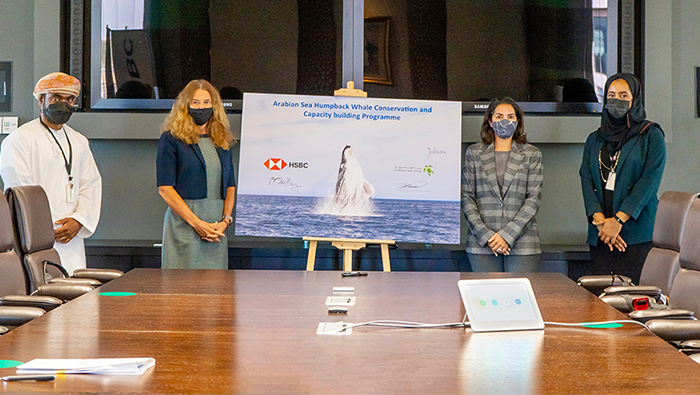
Young scientists from ESO and Future Seas get a taste of humpback whale research in the Gulf of Masirah in November 2021. Photo by Gianna Minton.
Press release shared by ASWN partner, the Environment Society of Oman (ESO): In recent weeks, the ESO signed a two-year sponsorship agreement with HSBC Bank Oman to support its efforts towards the conservation of the Arabian Sea humpback whale. Under the partnership, ESO will carry out two new projects; a Conservation Management Plan that aims to work with local authorities to implement alternative solutions to harmful marine practices that threaten the whales’ survival, and a Capacity Building programme that focuses on developing the next generation of cetacean (whales and dolphins) researchers.
Maia Willson, Research and Conservation Manager at ESO, said, “We’ve been researching Oman’s whales for the last 20 years with the help of local and international collaborations. Whilst this work is still ongoing, we now have sufficient scientific information to inform conservation actions. As we move into 2022, our attention turns to how we tackle the issues threatening the survival of the endangered Arabian Sea humpback whales. With the valuable support of HSBC, we are able to move towards tangible action, to help implement policies for greater protection, and to prepare the next generation of local marine research and conservationists needed to continue this vital work.”
“HSBC has a longstanding commitment to support the communities in which we operate. Through our partnership with the Environment Society of Oman, this conservation and capacity building programme will give a valuable opportunity to develop the next generation of marine researchers and activists and support one of the UN Sustainable Development Goals on building human and institutional capacity on climate change mitigation,” said Melika Betley, CEO of HSBC Oman.
The Arabian Sea humpback whale is one of one of 20 species of marine mammals found in Oman’s waters. Classified as Endangered on the IUCN Red List of threatened species in 2008, it is estimated to be one of the smallest and potentially most vulnerable whale population in the world, numbering fewer than 100 individuals. Research supported by ESO has also proven Oman’s humpback whales to be the only known population in the world not to migrate between high and low latitudes, staying instead to breed and feed in the waters surrounding Oman.
Believed to have been isolated in the Arabian Sea region for c. 70,000 years, they are a highly distinct population with photo-identification studies resulting in no matches outside of the Arabian Sea region and acoustic studies revealing a highly distinctive song.
Since its inception in 2004, ESO has focused on developing a better understanding of the distribution and ecology of the different whales found in Oman’s waters. Among its achievements last year, the country’s only non-profit organization focusing on environmental preservation launched the Marine Mammal Atlas of Oman, a publication that is the culmination of 20 years of scientific research and serves as an important reference for studies on environmental diversity, while also raising awareness on the species.
As a non-profit organization, ESO continues to rely on the generous support of sponsors and members to deliver this work. For more information on how to support, make a donation, or to find out other ways to get involved, visit eso.org.om.

ESO partners with HSBC Oman for Arabian Sea humpback whale conservation
